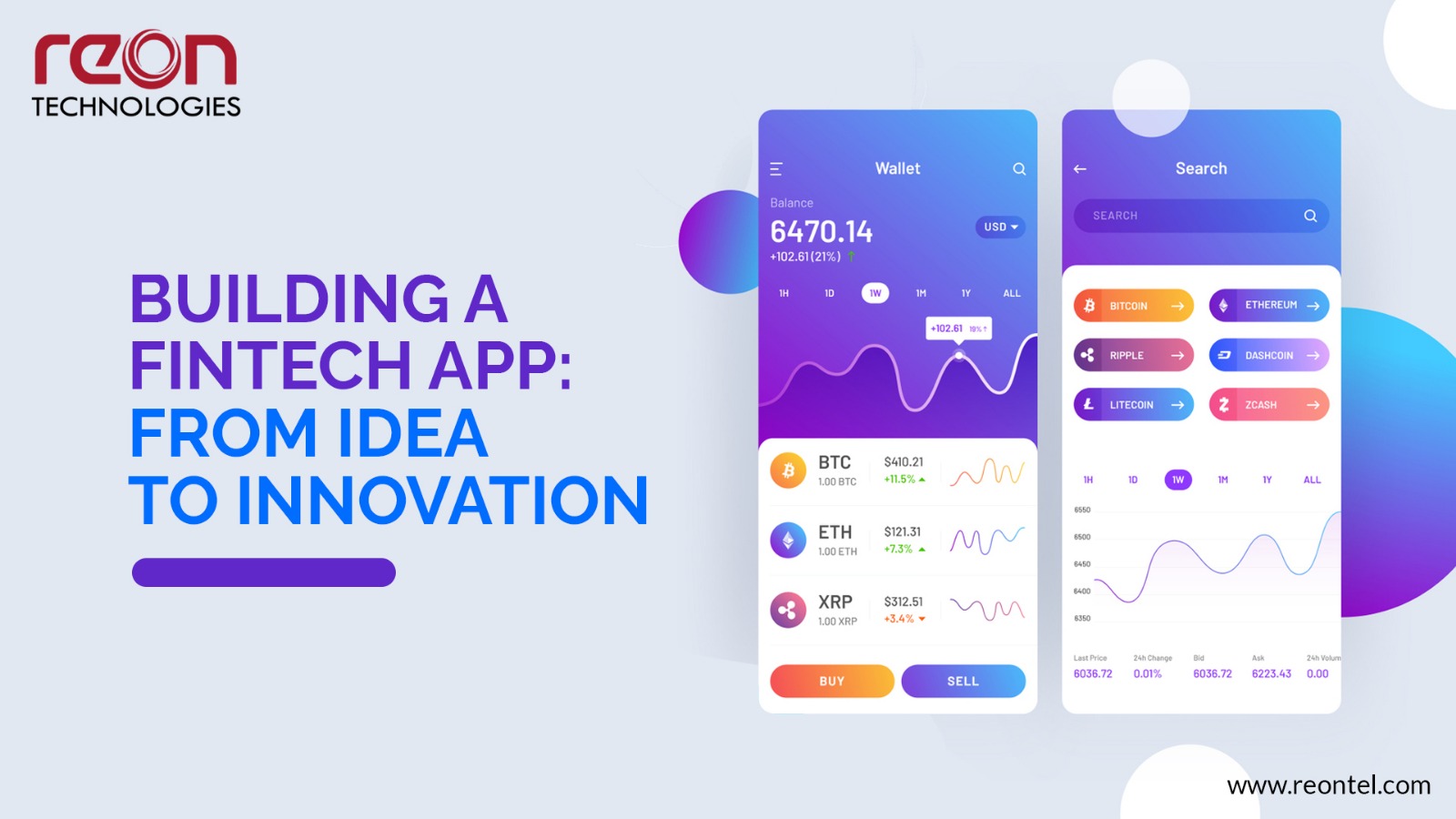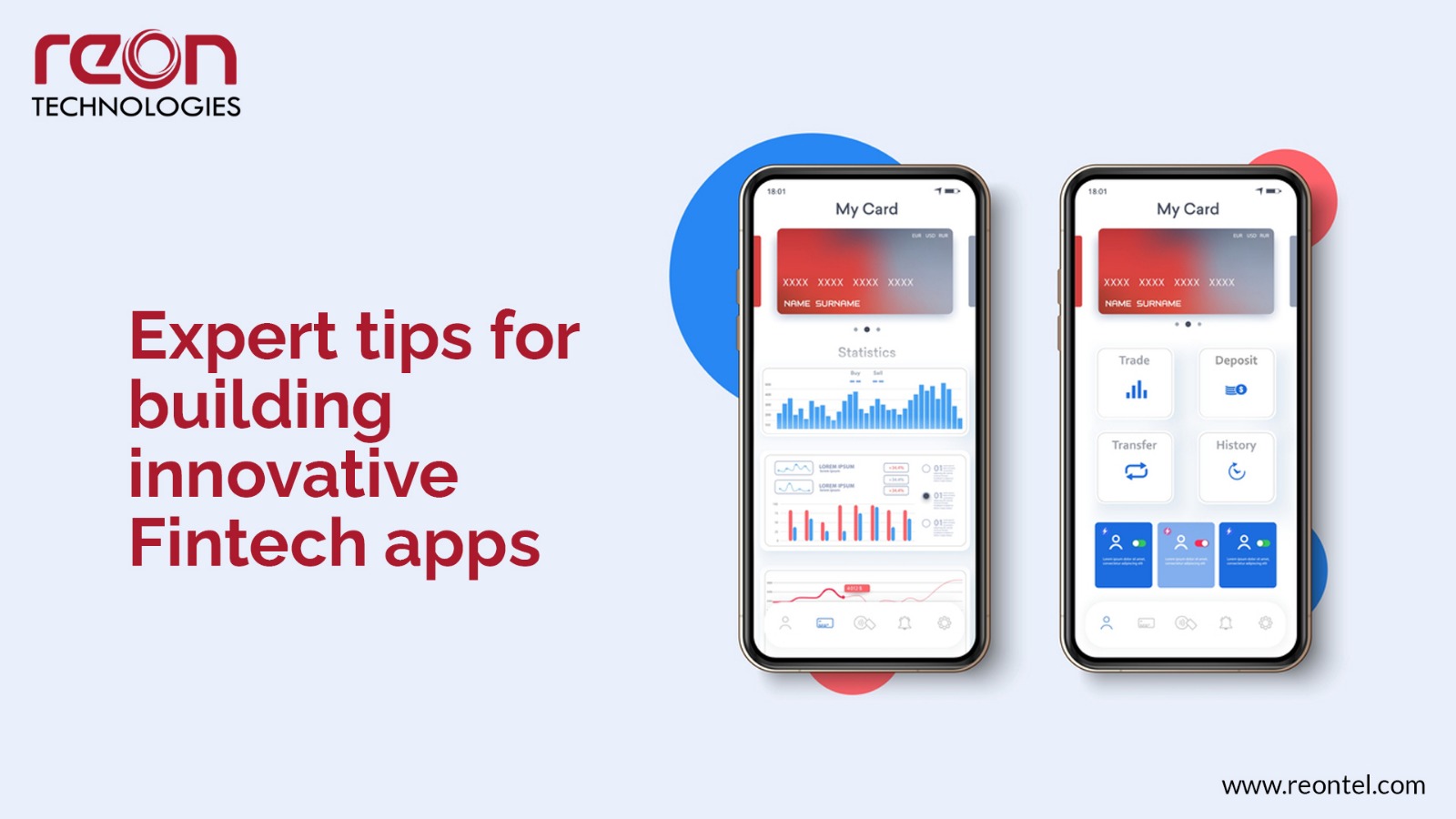 26.04.2023
26.04.2023
Building a Fintech App from Scratch: Tips and Tricks for Success
Financial Technology (Fintech) refers to any web or mobile app that aims to improve and automate the delivery and use of financial services. It assists organisations, entrepreneurs, bankers, and other entities in dealing with money duties more successfully by employing specific programmes and computations that may be utilised on computers or even cellphones. It first appeared in the twenty-first century, and the phrase was initially restricted to the back-end systems of established financial organisations. However, it has now shifted to customer-oriented solutions. It now includes many domains such as education, retail banking, financial exchange, stock market, and so on.

Different Types of Fintech Apps
A Fintech mobile app development firm incorporates financial and technological domains such as blockchain, banking platforms, and budgeting tools. If you believe your development should comprehend your concept, you must determine the value of a product to customers. Fintech applications include a wide range of functions:
Insurance Mobile Apps
As the name implies, these programmes are designed for the insurance industry to help speed up claim processing, policy administration, and reduce fraudulent activity. It might be a basic CRM for an insurance website. An insurance application should include functions such as an insurance app, claims filing, quotes, contracts, searching through contracts based on various parameters, and so on.
Investment Mobile Apps - For Stock Trading, Mutual Funds and Cryptocurrency
These applications are primarily employed in the stock market. Users cannot examine assets or invest in them using these programmes, but they can boost the effectiveness of investments. To develop an investing application, you must integrate core features such as multi-currency, investment funds, credit management, asset correlation, real-time notification, and client assistance.
Banking and Money Management Mobile Apps
Banking applications enable users to manage their bank accounts and view financial transactions without having to visit a bank. In general, mobile applications are the greatest alternative for banks because people prefer to do financial activities on their smartphones.
Lending Apps - Money Lending Mobile Apps
You can lend money without the involvement of a typical bank or credit union using the lending applications. You can lend money while still sitting in your chair. They have become one of the most popular Fintech technologies. There is no delegation investment, such as loan specialists, banks, or other financial institutions. Because there are no intermediaries, the interest rate is lower and investors profit more.
Consumer Finance Apps - Budgeting and Personal Finance Mobile Apps
These applications are not always associated with payment services. These programmes assist clients in managing their spending, saving money, and forecasting future expenses so they do not overspend. Financial goals, cost and bill tracking, investment analysis, fraud warnings, and other features are typical in these programmes.
Major Requirements of Fintech App Development
As previously stated, the Fintech environment is highly complex, therefore you should first examine the qualities that will help you flourish with your firm. The following are the main characteristics of a Fintech App Development:
Security
Security is the primary concern in the Fintech industry. If users encounter security vulnerabilities even once, they will remove your program without hesitation. Some of the key characteristics that can increase the security of your Fintech application are:
• Fingerprint or Face Scan security • two-factor authentication • Login using OTP • Dynamic CVV2 Codes
Integrations
API is the cornerstone of developing a financial application. APIs, or Application Programming Interfaces, allow multiple apps or portals to communicate with one another. APIs in the Fintech industry can issue orders to third-party service employees.
Flutter, of course, makes use of the Dart programming language. Dart is a completely object-oriented programming language, and because it has a C-based sentence structure style, it is simple to grasp and learn if you are familiar with a comparable grammar style. Furthermore, Dart can be translated to ARM and x86 code, and with the most recent version of Flutter, you might be able to transpile it to JavaScript so that your Dart code can run properly on the Web.
Simplicity
If you want your Fintech application to flourish, create it with an easy-to-follow plan. To utilise your application, Fintech users do not need to answer a slew of questions. The prospect of developing fintech applications is to create analytical tools for collecting financial data and creating financial projects with a simple interface.
There are real-time analytics and statistics that show with the purpose of allowing consumers or businesses to readily locate their income, costs, investment funds, and so on. The Fintech application should be easy and understandable in order to attract a larger audience.
Support
The whole Fintech business employs extremely private information. As a result, you cannot rely on third-party customer assistance and must instead employ advisers to handle consumer inquiries. They should be prepared to work under extremely tight safety norms and regulations.
Monetizing Your Fintech Application
If you've decided to create a financial application, the first step is to select a primary monetization model. After your application is up and running, you can present additional features and service options based on various monetization standards; nevertheless, you must start with something to begin returning on investments.
The following are a few examples of well-known adaptation models employed by well-known fintech organisations nowadays.

Subscriptions
The most common and recognisable model for everyone who has ever used an internet service or a mobile app of any type. Users are usually given a trial time ranging from a few days to a month to explore the highlights and determine their value to their needs. After that, users are charged the cost of the chosen subscription at regular intervals (weekly, monthly, or yearly).
Transactional fees
This concept is commonly utilised by mobile payment applications and payment systems, where fees might apply to all or select payment types. Payoneer and WorldRemit are two excellent examples of money transfer businesses that provide inexpensive rates on international cash transfers as well as a variety of options for receiving remitted payments. This monetization technique can be utilised in conjunction with memberships or as the sole revenue source.
Promotions and Referrals
If you create a large enough client base, highly skilled ads and referrals from major advertisers might become the foundation of your fintech monetization strategy. Users can use your services for free, but they will get highly personalised business pitches from advertising. Every conversion earns the service owner money. For example, Mint employs this strategy for their free service, combining it with various revenue-generation strategies for their premium service.
Selling Big Data
Fintech applications are an excellent source of substantial, actionable financial data about customers' money management habits, installment frequency, average spending, consumption of certain services, and more. Fintech companies are fully expected to provide paid access to this information (anonymized, of course) to any interested outsider hoping to improve their marketing or sales strategy with better targeting and great informational data sets for their artificial intelligence and machine learning algorithms.
Key Functional Domains to Make a Fintech Application in 2023
Fintech is a massive sector with numerous verticals and business strategies that are continually evolving and mixing. Let's take a look at some of the most well-known applications of financial technology today. If you're thinking about developing a fintech application, you should look at these areas for ideas.
Digital banking
Generic banking apps have been around for a long time and can be found on practically any smartphone in the world. They are designed to connect directly to users' bank accounts and provide everything needed for managing personal funds, taking care of recurring invoices and making SWIFT cash transfers, creating expenditure reports, and conducting various other basic everyday operations. Banking apps can be created by comparing banking institutions or by third companies such as Chime or Atom Bank.
Payments and cash transfers
Online payments and money transfers have traditionally been among the most well-known and popular online services that have supplanted the rigid banks of the pre-digital era. Contactless payments and installments made using a QR code are becoming more popular. Payment services like Klarna, Venmo, and Stripe have transformed the way people and businesses pay, while money-transfer services like Payoneer, Wise, PayPal, and Revolut have made it vastly easier for consumers to send money to their loved ones.
Cryptocurrencies
Cryptocurrencies are one of the most popular financial trends, as well as a driving force behind the rapid expansion of the fintech industry. Crypto exchanges, real-time investing and trading platforms, and multi-currency wallets that support both fiat and digital currencies are examples of financial services in this sector. Some of these wallets employ blockchain technology to store users' information and financial data.
Robo-advising and stock trading
The stock market's dynamics are so intense that trading requires information, expertise, and instinct, as well as a lot of automation and the application of cutting-edge AI/ML algorithms for data analytics and pattern recognition. Robo-advisors are intelligent algorithmic programmes that assist consumers with wealth management and investment management for a fraction of the cost of comparable services provided by human portfolio managers at banks.
Conclusion
Fintech is a well established and highly demanded technology in terms of financial services. Reon technologies can not only build you a high performing and scalable fintech application, we also provide the assistance and support for as per requirement as well. Get a quote today, and work with us to build the all in one fintech application for all financial services.
Analytics / Marketing / Technology
Recent Blogs
 15.03.2023
15.03.2023
Design or Content: A Chicken and Egg Conundrum?
Many firms take a design-first approach. Putting design and development first isn't a fatal flaw. It is perhaps effective. However, ignoring the value of content in the process is a concern.
 20.12.2022
20.12.2022
Why do Fintech Startups Prefer the MERN Stack?
The fintech domain have rapidly grown, especially due to the pandemic that accelerated digitalization within all business sectors. And now what do you mean by fintech?
 21.03.2022
21.03.2022
ERP Software’s are a business necessity and here's why
Starting a business is much easier than managing it. Hence, many enterprises collapse due to a lack of better management.
 16.05.2022
16.05.2022
Why choose Agile Methodology for your Mobile App Project
There is an old saying, unity adds to productivity. It means when a few people come together to complete a task, the result is quick...
 01.07.2022
01.07.2022
Easy Ways to do local SEO for your business in 2022?
The internet has shortened distances. Now we can do business across continents. But not all companies require a global audience.



